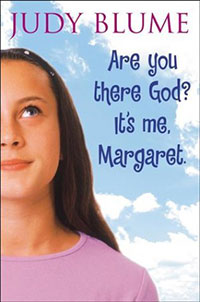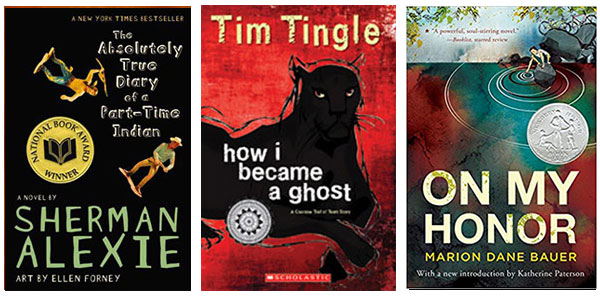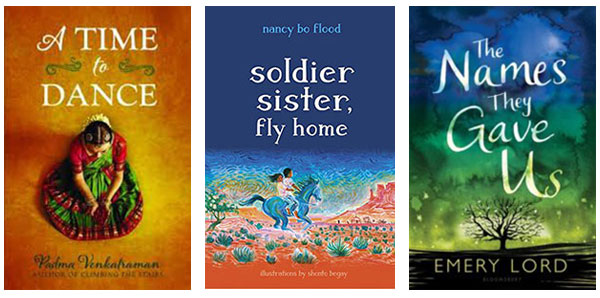Banned Books, Banned Topics:
Prayer, still forbidden in children’s literature
 Imagine the prayer of a child who has just moved to a new place. Let’s listen in:
Imagine the prayer of a child who has just moved to a new place. Let’s listen in:
“Are you there, God? It’s me, Margaret. I’m in my new bedroom but I still have the same bed. It’s so quiet here at night –nothing like the city. I see shadows on my wall and hear these funny creaking sounds. It’s scary, God!”
Of course, from Judy Blume’s revolutionary and BANNED BOOK Are You There God? It’s Me, Margaret, a Richard Jackson Book from Simon and Schuster, published in 1970.
Margaret’s prayer was asking for safety, for protection from the unknown. Her prayers asked – please listen, help me understand, myself, being a friend, and please, let me have my period SOON.
Margaret’s understanding of prayer was simple and uncomplicated. Speaking with a god, a personal god, who listens. Who or what is this god? It doesn’t matter. What matters is that this force, this energy, is a being who hopefully has control over life, death, and getting one’s period.
What was revolutionary about that? Isn’t prayer a basic part of being human? Like being scared and asking for help? Being confused or lost in grief and ask, Why, god, why? Or being in awe and celebrating the mystery and beauty of the moment.
Why then is there a silent but strong taboo in children’s literature to having our characters reach out to the spiritual? We barely talk about menstruation (too messy), and even more messy—more political—is spirituality … whose god is the “real” god???
Are you there, God? It’s me, Margaret is a classic, a book that one reads with passion as a child, with amusement as a teen, and with a smile as an adult. Margaret talks to God at night, alone, personal. She feels a presence, someone is listening.
Times have greatly changed the rules for writing in children’s literature. Sex is okay but periods … maybe. Swearing, exploring gender identity, exploring sexuality—go right ahead. But spirituality? Tip-toe with caution, yet is there a more basic part of the seeking we do as teens as we ask, “what’s it all about?”
As authors, what scares us away from including the spiritual searches, questions, changes, growth of our characters? What scares away an editor from publishing a book that includes prayer?
Our characters are often challenged with terrible situations and great losses. Children lose parents, friends, identity, their health, their limbs. They are abused, molested, abandoned. How do they find strength, understanding, forgiveness, acceptance?
Our older characters are challenged with “coming of age,” of figuring out “Who am I, what do I believe, who do I want to become?” Adolescence is a time of putting aside childhood beliefs that were taught, were given, and then daring to step away from a childhood faith and search for one’s own, “What do I believe?”
In my book Soldier Sister, Fly Home, Tess feels anger, fear, and confusion when her older sister is deployed. Tess faces the questions asked by teens everywhere: “Who do I want to be? What can I control—death, life? And what must I accept?”
Our young-adult characters search for strength, for meaning, for connections, the safety and comfort of being with people that care about them, people they can trust. They also search for spiritual understanding. They search for a god that listens.
I close with these statements from Einstein: The most beautiful and profound emotion we can experience is the sensation of the mystical.…. That deep emotional conviction of the presence of a superior reasoning power, which is revealed in the incomprehensible universe, forms my idea of God.
The sensation of the mystical is part of every human, and thus a part of every character that journeys through our stories. But too often the mystical is kept silent. Why?
Are you there, God? It’s me ….

banned books you might consider reading

books you might consider reading in which characters consider their faith and beliefs
[Originally posted on Prayer Blog by Padma Venkatrama]
Enjoy this article by Marion Dane Bauer, “Celebrating Banned Books Week,” on her Just Thinking blog.